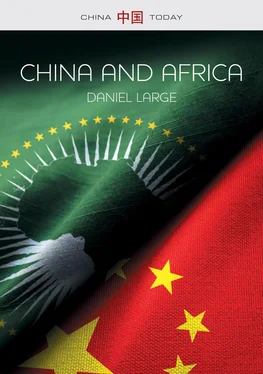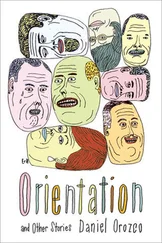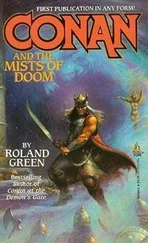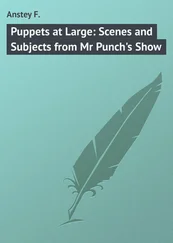UNMISS – UN Mission in South Sudan
UNOG – UN Office at Geneva
US – United States of America
WHO – World Health Organization
WTO – World Trade Organization
ZANU–PF – Zimbabwe African National Union–Patriotic Front
Tables and Boxes 
TABLES
1 China–Africa Trade, 2002–2019
2 China Imports from Africa: Top 10 Countries, 2019
3 China Exports to Africa: Top 10 Countries, 2019
4 Chinese FDI Flows to African Countries: Top 10 Recipients in 2019
5 Chinese Loan Commitments to Africa, 2000–2018
6 Chinese Loan Commitments to Africa by Lender, 2000–2018
7 Top Arms-Supplying Countries to African Countries, 2014–2019
8 China’s Contribution to UN Peacekeeping by Mission in Africa, 2020
1ANC–CCP Party Relations
2Gold Mining in Ghana
3Chinese in Namibia: Becoming a Single Social Field?
4South Sudan: Gaining Experience Under Fire
Introduction 
Two large maps of Africa and China, under the caption ‘Friendship Peace Cooperation Development’, stood out at an official exhibition off Tiananmen Square in November 2006. The Africa map was filled with images of smiling children, a baobab tree, a bare-chested man drumming, and hints of the ruins of an ancient civilization. That of China was filled with images of the Great Wall, Forbidden City and other civilizational achievements. At the time, the Chinese government was hosting the third Forum on China–Africa Cooperation (FOCAC) and Beijing had been carefully prepared to welcome leaders and delegations from some 48 African countries. Billboards proclaiming ‘win–win cooperation’ and other official slogans signalled the Chinese government’s portrayal of China as a different, progressive partner of the continent. This FOCAC put China–Africa on the map of global attention, and catalysed interest in China’s suddenly visible engagement with the continent. Cliché images aside, the emptiness of this map of the African continent, however, suggested ignorant paternalism at a time when relations were rapidly developing.
Much has changed since then, as has become evident in the ‘New Era’ of China’s relations with Africa. China’s New Era is the era of Xi Jinping. Since taking power as General Secretary of the Chinese Communist Party (CCP) in November 2012, and becoming state president in March 2013, Xi Jinping has presided over a transformation in China’s domestic and global affairs. In 2018, at another FOCAC in Beijing, he welcomed ‘African countries aboard the express train of China’s development’ and declared: ‘No one could hold back the Chinese people or the African people as we march towards rejuvenation.’ China committed financing in Africa of $60bn and a marked expansion of its investment in human capital and training. Xi Jinping reportedly met the leaders of 53 African countries for an event described by China’s Foreign Minister as setting ‘a new record in FOCAC history, and indeed, in all the diplomatic activities China ever hosted’. 1Welcoming Gambia, Sao Tome and Principe, and Burkina Faso, which had previously supported Taiwan, the summit confirmed China’s near total victory over Taiwan in the continent. Africa, as the President of Burkina Faso, Roch Marc Christian Kaboré said, had ‘chosen China’. This FOCAC showed how established China’s relations with Africa had become in Xi Jinping’s New Era.
This book aims to bring the China–Africa story up to date. 2It argues that politics defines China’s New Era Africa relations most, thus challenging conventional wisdom and popular associations about China’s relations with Africa, which hold that ‘Chinese leaders see Africa mainly as a source of natural resources.’ 3Politics is a fluid, highly contested concept, which attracts simple definitions but defies easy characterization. Using a more expansive understanding, this book situates the politics of relations in terms of Chinese and African histories, institutional frameworks and politics, before exploring select key themes: China and Africa in global politics, evolving economic ties, the China model and African politics, Chinese–African relations, and China’s expanding security engagement in the continent.
China–Africa relations have never been just about politics or economics but shifting combinations of both across different historical periods. Politics always mattered; it drove post-colonial revolutionary ties and never disappeared. Since around 1996, however, economics has been the main association between China and Africa, following the tour by China’s then President Jiang Zemin of six African states that marked an inflection point ‘from geopolitics to economics as the driver of ties’. 4In 2000, President Jiang spoke of the ‘all round friendship’ between China and Africa. Nonetheless, economics was the foundation of a ‘long-term partnership’ and enhanced economic ties would do most to help China’s domestic economic development while contributing to growth in African countries. 5Since 2012, however, and Xi Jinping’s leadership of China, there has been a shift towards a decisive role of politics both inside and outside China, including in its Africa relations.
Arguing that politics needs to be returned to the centre of understanding China’s Africa relations today is not to suggest, simplistically, that economic ties are of secondary importance. Nor that politics can be separated from economics. Economic factors remain central to relations but are very much bound up in and determined by politics of various kinds in an evolving political economy of relations encompassing a spectrum of local to global dimensions. China’s role in Africa has also always had its own politics but these have become much more prominent, deeper and widespread in the New Era. In other words, much arises from the nature of economic ties, from the diverse impacts of China within African countries, unease about China as a creditor, Chinese migration, security challenges and, ultimately, perceptions of its new power. At the same time, Chinese government officials have come to recognize how central politics is, not just for China’s relations with Africa or in terms of China’s global politics but also to achieving Africa’s broader development goals.
What, then, is China’s New Era, and what does this mean for its Africa relations? The term ‘New Era’ simplifies and provokes questions (what was wrong with the old one? how long can something be new?). In essence, it means the reassertion of China’s party-state under Xi’s leadership in Chinese domestic politics and economy. It also means a more ambitious and expansive role for China abroad, signalled in Xi’s closing speech at the 18th National Congress of the CCP in November 2012, when he talked of the ‘great renewal of the Chinese nation’. 6The CCP’s 19th Party Congress in October 2017 was seminal in declaring the New Era and defining Xi’s power. It elevated him to the core of the CCP’s leadership, with no anointed successor. In his report to the Congress, Xi Jinping noted that China had ‘stood up, grown rich, and is becoming strong’. The New Era would see ‘China moving closer to centre stage’ and this would require ‘major country diplomacy with Chinese characteristics’ in order to build China into a great, modern and global ‘socialist power’ by the mid twenty-first century. 7The approach China had adopted after 1978, that of keeping a low profile in order to focus on domestic development, was dumped in the dustbin of history. The CCP’s grand strategic goal has become the ‘great rejuvenation of the Chinese nation’. Following the 19th Party Congress, the New Era refrain was incorporated into China’s Africa relations. China’s relations with Africa have evolved considerably to become more complex, multifaceted and consequential. Relations are continuing to evolve, in much changed and changing circumstances within China, in China’s relations with 53 different African states and global politics.
Читать дальше













